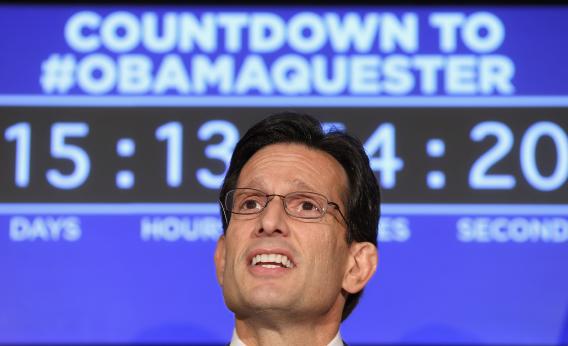Nice long Eric Cantor profile from Ryan Lizza is ably summarized by my colleague David Weigel, who observes that there’s a deep reason why Cantor’s bets on rejecting compromise keep not paying off: “The idea that you can be a deficit hawk while ruling out any tax increase, ever, is politically and mathematically untenable.”
What I don’t understand, and what I think reams of congressional reporting haven’t yet explained adequately, is why Republicans are ruling out any tax increase. If you think back to the failed grand bargain talks, Obama was offering a bigger spending cut than House Republicans were proposing, but the GOP preferred an equilibrium with higher spending and lower taxes to one with lower spending and higher taxes. That’s a sensible preference ranking for a movement that’s deeply invested in Old Keynesian ideas about countercyclical fiscal policy, but it wasn’t Paul Krugman who rejected the Obama austerity package—it was John Boehner and Eric Cantor.
Had Mitt Romney won in 2012, nothing about having agreed to a tax hike as part of a big spending deal with Obama would have prevented them from turning around and cutting taxes. And in the long run, every dollar that’s spent ends up needing to be paid for. Accepting high spending as the price you need to pay for low taxes makes no sense outside a narrow stimulus context.
And I’ve never seen a Republican leader really challenged to explain his view on this. When asked why they reject a grand bargain, Republicans seem to answer the question: Why do you prefer an all-cuts strategy? But that’s not the question. Nobody gets what they want in politics. What they do is strike deals to advance their objectives. If you say your top objective is spending cuts, and the president of the United States says he’ll give you spending cuts—huge ones—if you agree to tax increases, then the natural thing is to say yes to the deal. If he says he wants you to stand on your hand and recite the Pledge of Allegiance instead, that’s what you do. But that’s not what he’s asking. He’s asking for tax hikes to give himself some political cover. And Republicans won’t take yes for an answer. But why? I can speculate and so can you, but I’d love to really hear and understand what the thinking is.
